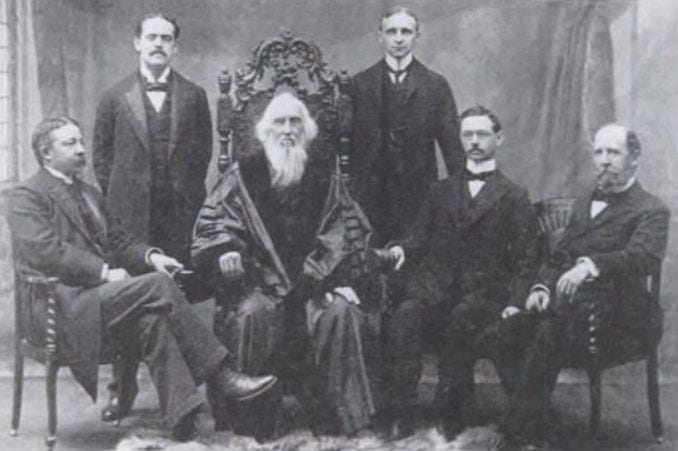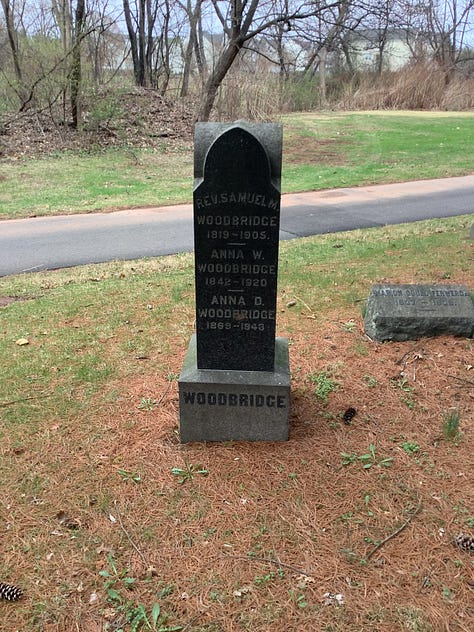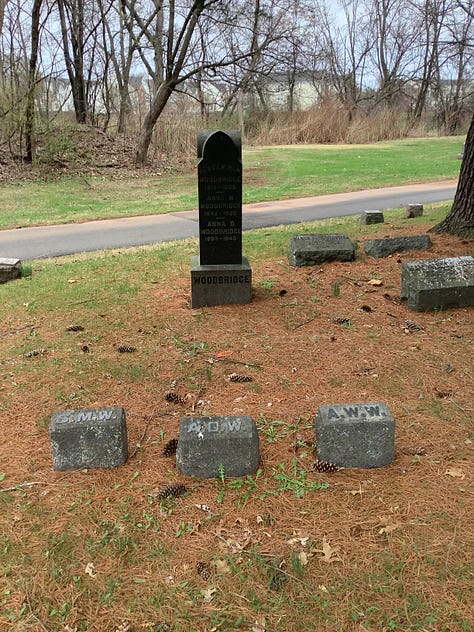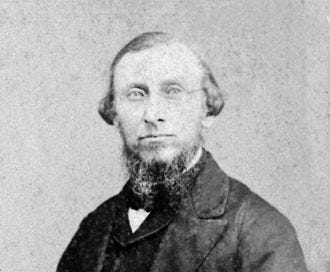Every year, on the last Saturday of April, New Brunswick celebrates Rutgers Day. While most of the festivities take place on campus at Rutgers, we at Elmwood Cemetery are also celebrating by hosting our walking tour Rutgers on the Rise: Exploring the University’s History at Elmwood. Now we know that the month has only just begun, but Rutgers day will be here before we know it. Because of that, and because Easter is also coming up, we thought we would highlight an individual who was important to Rutgers history and who was a man of the cloth.
Born in Greenfield Massachusetts, Samuel Merrill Woodbridge came from a long line of clergymen. Unsurprisingly, he would follow the family tradition and become a reverend himself. He initially attended New York University, where he graduated with a Bachelor of Arts degree in 1838. While there he became a member of the Eucleian society and the Phi Beta Kappa honor society, evidence that he was a diligent student, and well liked by his peers. Following that, he would travel to what would eventually become his home, New Brunswick, to attend the New Brunswick Theological Seminary.
Woodbridge graduated from the Theological Seminary in 1841, the same year he would be made a minister in the reform church. He would begin his pastoring that year in South Brooklyn. In 1845 he would marry Caroline Bergen. Later that year the couple would have a daughter, named Caroline after her mother. In 1859 he would begin pastoring in Coxsackie, located in upstate New York. Now you may be asking, how did Woodbridge end up back in New Brunswick when it seems he had firmly established himself in New York? Well, in 1852 Woodbridge was invited to become the pastor of the Second Reformed Church of New Brunswick, which he accepted.

Interestingly, he replaced Rev. David Demarest, a professor at the Theological Seminary and member of the Rutgers Board of Trustees. Now, we don’t know the exact relationship between Demarest and Woodbridge, but given his previous relationship with the Theological Seminary, and his future relationship with both the seminary and Rutgers, it is hard to imagine that Woodbridge didn’t know Demarest, and it is possible that Demarest recommended Woodbridge. We do know for a fact that Demarest’s son, William H.S. Demarest, the future president of Rutgers, would be one of Woodbridge’s students. Alternatively, it might be nice to imagine that he chose to return to New Brunswick due to a love of the city, although we can’t really know what motivated him to return to New Brunswick. Whatever his reasons, he would live here for the rest of his life.
In 1857, Woodbridge would be offered and would accept appointments to become a professor at both Rutgers and the Theological Seminary. At Rutgers, he was professor of Metaphysics and Philosophy of the Human Mind, a position he would hold until 1864. At the Theological Seminary he taught ecclesiastical history and church government, which he did for 44 years, until he retired in 1901 at the age of 82. Given his long tenure at the school, it is unsurprising that he would also teach other courses whenever there were vacancies when faculty left or passed away. Even after retiring, the school would honor him with the title of emeritus professor until his passing.



It was somewhat interesting that Woodbridge was hired to both schools at the same time. Despite the two schools being separate from each other, the Seminary and Rutgers were very closely aligned, and the Dutch Reformed Church was still a big part of Rutgers, even as it became the land grant school of the state and opened up the Scientific School. It is worth noting that at the time of the beginning of President William H. Cambell’s term, of all of the professors at Rutgers College at that time, only Professor George Cook didn’t have a background of religious training. Additionally, many members of the board of trustees had direct ties to the church or were also ministers themselves, so Dr. Woodbridge is a prime example of the ways that Rutgers was still heavily tied to the Dutch Reformed Church at the time of President Campbell.
Woodbridge’s wife would pass away in 1861. Five years later, in December of 1865, Woodbridge would marry again, to Anna Whittaker Dayton, who would have two daughters: Anna, who was born in 1869 and who was named after her mother (much like Caroline Woodbridge), and Mary Elizabeth who was born in 1872. Woodbridge was popular amongst his students, fellow faculty, and parish. It was said that he was kind-hearted and had the ability to make dry subjects seem more interesting, which, given his line of work, was undoubtedly a useful ability.
In 1897, the fortieth anniversary of when he joined the faculty at the Theological Seminary, Woodbridge was honored by addresses from fellow faculty, former pupils, and academics from other seminaries. Clearly, Woodbridge had become well respected over the course of his career. After his retirement in 1901, he would remain involved with the Seminary, an institution that he had devoted over four decades of his life to. On June 23rd, 1905, Samuel Woodbridge would pass away at the age of 86, leaving behind an impressive professional legacy.
Sources:
Corwin, Charles Edward. A Manual of the Reformed Church in America (Formerly Reformed Protestant Dutch Church), 1628-1922. New York, NY: Board of Publication & Bible School Work of the Reformed Church in America, 1922.
Fortieth Anniversary of the Inauguration of the Rev. S. M. Woodbridge: As Professor in the Theological Seminary of the Reformed (Dutch) Church in America at New Brunswick, 1857-1897. Thursday, May Twentieth. United States: Alumni Association, 1898.
General Alumni Catalogue of New York University, 1833-1905: College, Applied Science and Honorary Alumni. New York, NY: General Alumni Society, 1906.
Mitchell, Louis. The Woodbridge Record: Being an Account of the Descendants of the Rev. John Woodbridge, of Newbury, Mass. New Haven, CT: Priv. print, 1883.
Raven, John Howard. Catalogue of the Officers and Alumni of Rutgers College (originally Queen's College) in New Brundswick, N.J., 1766-1916. Trenton, NJ: State Gazette Publishing Company, 1916.
“Rev. Dr. John H. Raven.” Zeta Psi Fraternity. Accessed April 8, 2025. https://zetapsi.org/phi-alpha-bios/john-h-raven/.
“Samuel Merrill Woodbridge (1819-1905).” Log College Press. Accessed April 8, 2025. https://www.logcollegepress.com/samuel-merrill-woodbridge-18191905.
Sidar, Jean Wilson. George Hammell Cook: A Life in Agriculture and Geology. New Brunswick, NJ: Rutgers University Press, 1976.



